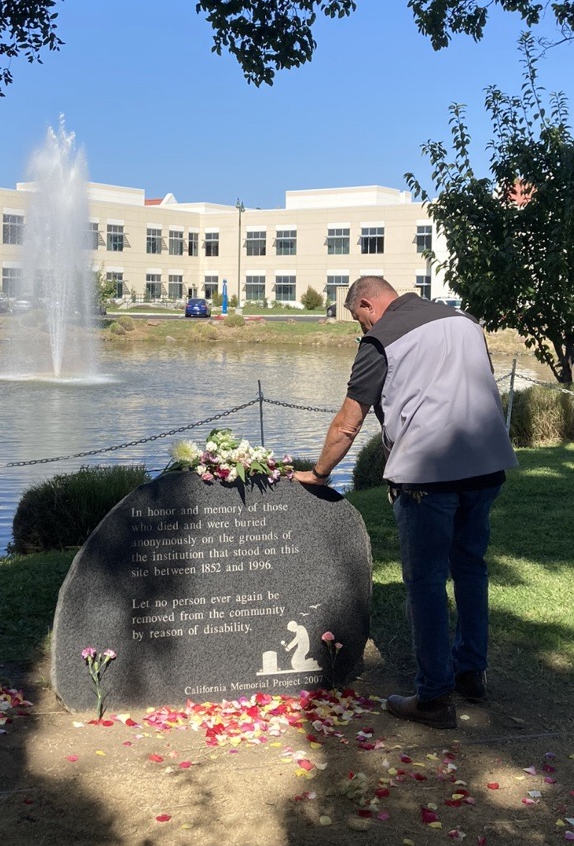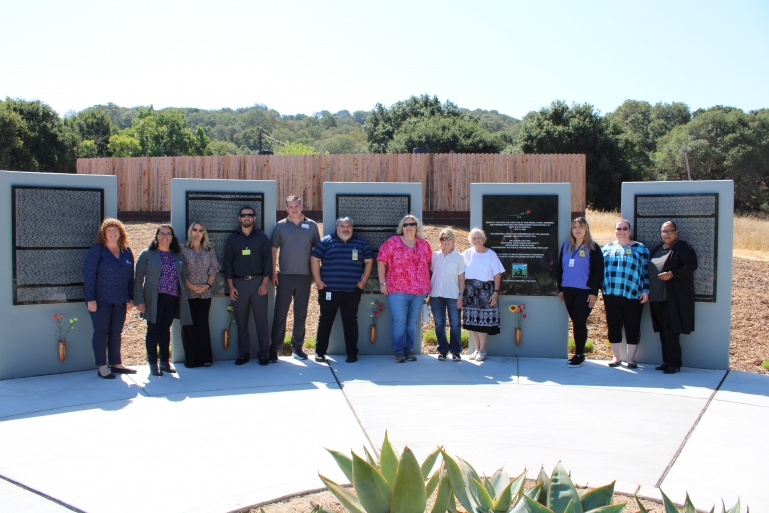Restoring Dignity: The Mission of the California Memorial Project (CMP)

Restoring Dignity: The Mission of the California Memorial Project (CMP)
The California Memorial Project (CMP) is dedicated to a profound yet often overlooked mission: honoring and restoring dignity to individuals who lived and died in California’s state hospitals and institutions. For over a century, thousands of individuals with mental health disabilities and intellectual and developmental disabilities were housed in these institutions, many of whom passed away in anonymity. Often buried in unmarked or mass graves, these individuals never received the respect or recognition they deserved in life or in death. Today, the CMP is working to change that.
A History of Forgotten Lives
From the mid-1880s to the 1960s, more than 45,000 people died while in the care of California’s state hospitals and developmental centers. Many of them were buried in institutional cemeteries where their graves were identified by numbered markers that have long since disappeared. These individuals, once patients in facilities like Modesto, Napa, and Patton State Hospitals, were left in unmarked graves, their lives erased from history. This neglect extended even to those whose remains were donated to medical research without their or their families’ consent.
The CMP was born out of the desire to rectify this historical injustice. Legislation introduced by Senator Wesley Chesbro in 2001 and 2006, (SB 1448; SB 258) laid the groundwork for the project by identifying the locations of gravesites, researching patient records, and developing plans for the restoration of these long-forgotten cemeteries. These efforts ensure that individuals who died in state institutions are remembered with dignity, rather than relegated to the annals of forgotten history.
The Significance of the California Memorial Project Today
For families, the CMP offers an opportunity to reconnect with their ancestors, many of whom they may never have known were patients in state institutions.

“People want to have a way to reconnect to their ancestors whose name may be in a state hospital record."
Supervising Coordinator Disability Rights California’s Peer Self Advocacy (PSA) program

For some, like a family who recently discovered that their relative was once a patient at Patton State Hospital, the CMP provides the chance to honor their loved one’s memory. “This year we had a family call us,” Tellez adds. “They are traveling for 9/16/24 to DSH-Patton [Department of State Hospitals-Patton]; they coordinated a museum tour since they recently found out their family member was a patient/resident at Patton.” For that family, the upcoming Remembrance Ceremony will be a personal and meaningful way to reclaim the dignity of a relative lost to institutionalization.
Annual Remembrance Ceremonies

Every year, on the third Monday in September, CMP partners, families, and communities come together for the Remembrance Ceremonies. These events, held at various former state hospital sites, provide a moment of reflection and acknowledgment for those who were once forgotten. At these ceremonies, people gather to speak the names of the dead, remembering them not as anonymous patients or numbers on a chart but as individuals whose lives mattered.
“I had a moment in history to honor the many lives that passed there,” recalls Tellez, who attended the inauguration of the plaque placed at the former Camarillo State Hospital. This kind of recognition is vital to removing the stigma associated with mental health disabilities and developmental disabilities, allowing families and communities to reclaim the humanity of those who lived and died in these institutions.
The Remembrance Ceremonies also serve to raise awareness about the importance of treating current patients in mental health and developmental facilities with dignity and respect, ensuring that history does not repeat itself.
Looking to the Future: The Legacy of CMP
The CMP’s work extends beyond remembrance. It aims to empower advocacy within communities and influence legislation that honors the lives of all individuals affected by state-run institutions. Projects like the CMP inspire peers and community members to advocate for legislative change, not just for those who died in state hospitals but for individuals affected by institutionalization today. “Projects like CMP empower peer-like communities to advocate for legislation to pass projects…to honor the lives taken by law enforcement,” Tellez explained. This empowerment is critical to fostering a culture of dignity and respect for vulnerable populations.
Moving forward, the CMP seeks to expand its impact, continuing to work with families, state agencies, and advocacy groups to ensure that those buried in institutional cemeteries are honored properly. The project’s goal is to restore these sites, preserving the memory of those who lived in these institutions and giving their families a place to grieve and remember.
Join the Movement of Remembrance
On September 16, 2024, the CMP invites everyone to join in a moment of silence to honor the thousands of lives remembered on that day. The CMP is a reminder that no life should be forgotten or erased from history. By restoring dignity to those who died in California’s state institutions, the CMP is also restoring our collective humanity.

The California Memorial Project continues to prove that even the smallest gestures, like speaking a forgotten name or restoring a long-lost grave, can create a lasting legacy of respect, dignity, and remembrance.

For more information on the California Memorial Project and how to participate in this year’s Remembrance Ceremonies, please visit our California Memorial Project 22nd Anniversary Remembrance Ceremony Page




